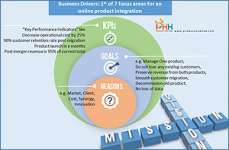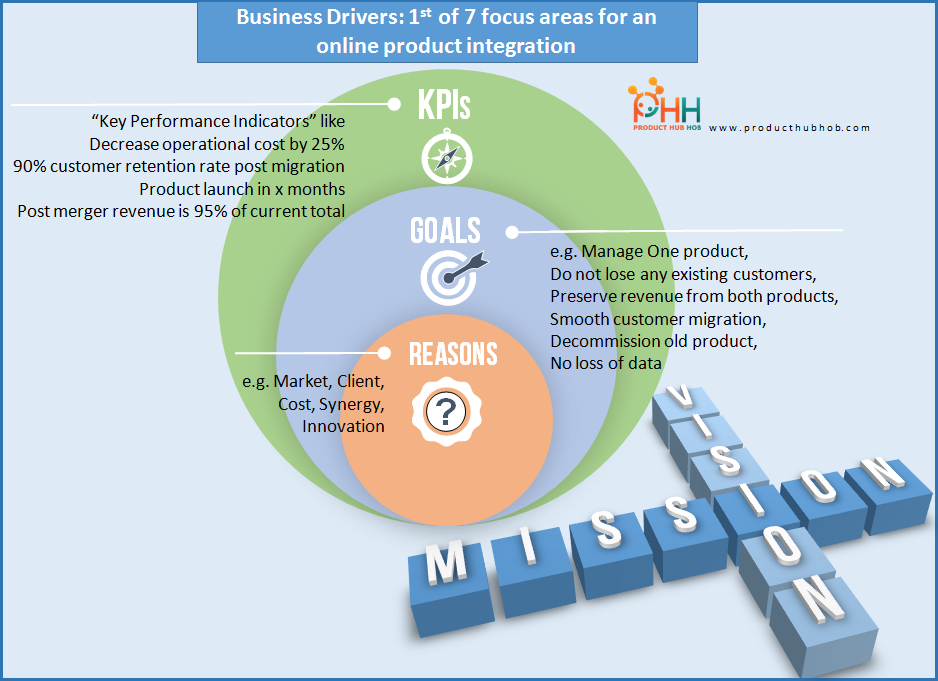 onkar@producthubhob.com
onkar@producthubhob.com
 0044-(0)7837282370
0044-(0)7837282370
 onkar@producthubhob.com
onkar@producthubhob.com
 0044-(0)7837282370
0044-(0)7837282370

Business Drivers: 1st of 7 focus areas for an online product integration
Written By: Onkar Singh Lohtham
Date: 29 Jun, 2016
(Reading time: 5 minutes)
In my previous article I picked up the live case of the online product merger between Elance & Upwork (leaders in Online Job marketplace). If a product manager asked me a question on ‘Where to start’, my answer would be to focus on the 7 focus areas:
In this article, I will explain in detail the importance of ‘Business Drivers’.

The 1st Focus Area: Business Drivers
From PHH’s experience, we first take a stab at the Business Drivers by asking 3 important questions. These need to be answered by the Project sponsor and the core team responsible for the merger of the two existing online products.
Question #1) What are the main reasons for merging the two online products?
As a product manager, it’s important for you to know the ‘Big picture’. This will help you ask the right questions and define more measurable KPIs for your product.
Answers could include: Capture new market, Increase presence in existing market, Capture new clients, Save operational costs, Company’s M&A decision, Benefit from synergy, Product Innovation etc.
Question #2) What is the expected end goal of the merged online product?
Once you have the answer from question#1, you would need an understanding of the goals of the merged product.
Answers could include: Sell a single product after merger, Decommission one product, Do not lose any existing customers, Smooth transition of customers from one product to the other, Do not lose any data stored in either products, Preserve the existing revenue from the products, Do not lose any feature offered by the products etc.
Question #3) What are the product level KPIs that would define a successful merger?
The longer the list of answers from question#2, the better for you. As a product manager, this gives you an opportunity to dig deep and define the list of parameters and associated metrics that define the success of the product post-merger.
The KPIs could include:
- Save operational cost of USD/GBP ‘X’ after decommissioning of old product
- Generate revenue equalling the 95% of the sum of revenues from 2 products
- Have a 90% customer retention rate post migration etc.
Now, you may ask why is it important to understand the Business Drivers upfront before diving deep into the project details. Here are the top 3 reasons:
1) Ability to make fact based trade-offs - There are various scenarios where you will have to make a trade-off between one approach and another, or you will have to prioritise a particular feature over another. The business driver will help in making that decision.
2) Maintain progress & achieve on-time launch - It is also a very good practice to keep looking back the business driver set at the start of the project, because this is the strong ‘WHY’ behind building this product. All actions, strategies, and decisions need to conform to this.
3) Accountability from Business Leadership - Once the business drivers have been decided, the whole product team gets behind it and works towards launching the product. In case there is a change needed, the good practice would be to amend the Business driver and align the rest of the strategies, plans and communication based on the revised set of business drivers. This makes sure that there is an element of responsibility & accountability behind changing the Business drivers and direction of the project.
Are there any other salient points regarding the identification and implications of Business drivers, which you have used or come across? I would love to hear your comments and thoughts.
Onkar Singh Lohtham | Onkar@producthubhob.com | www.producthubhob.com
Disclaimer: The merger of ‘Upwork-Elance’ has been used as an example to explain the product manager’s perspective, and does not bear any actual reflection of what was/is done for the merging of these online products.

HOW WILL WE WORK WITH YOU?

2 Hour Workshop
We come prepared to draw a blueprint of your product idea in a couple of hours

Solution Proposal
Based on your needs, we propose a tailored solution covering a mix of: Discover, Design, Define & Deliver phases

Start Project
Our team starts to work on your product as per the proposal
